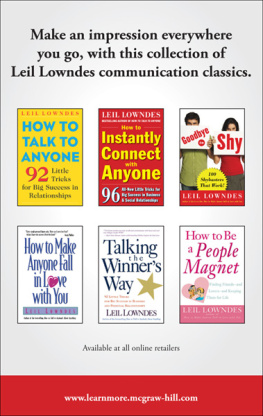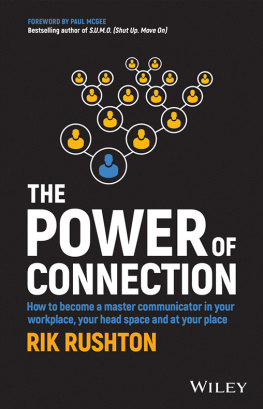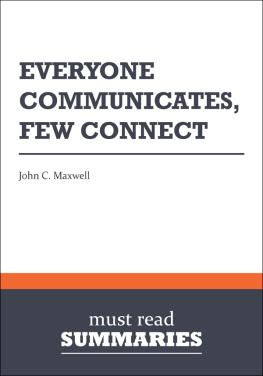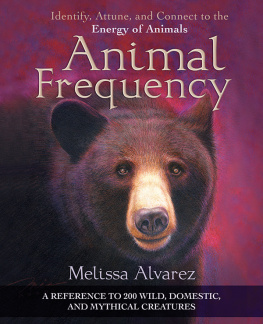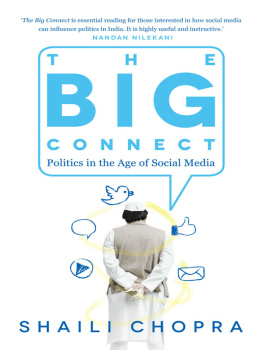Chapter 1 Stop the Fake Conversations
I hate business dinners, George Brinkman says to me. He says it with a ferocious conviction, and I am startled by the intensity of his comment. George is a seasoned business executive, a sharp guy with a keen mind. Funny, dry. The sort of fellow whose thoughts are always three steps ahead of everyone elses. George speaks well and uses language beautifully. And his senior role at a Fortune 500 company requires him to attend lots and lots of such dinners.
I hate the moment when we run out of things to say, George adds. Theres a long, pregnant pause. And that moment always comes
Hmm, I think to myself. What I really dislike is not the dinnersno, its the fake conversations. They leave me feeling empty, and they zap the life out of me. I have a hunch these are the conversations George is talking about. The sports/weather/favorite TV show/happy family conversations. The blah blah blah of predictable chatter. The blah blah blah of no surprises. The blah blah blah of just filling up time with easy narratives. You have been there. You know.
Behind each of these conversations lurk some pretty powerful beliefs that drive how we approach another person and engage them. Some are clear and up front in our conscious mind. They likely hail from the worlds in which we grew upour immediate family and the cultural norms into which we were bornand they explicitly inform what we say, what we dont say, the energy we use to engage, the social etiquette we follow or dont follow.
Theres a whole other range of beliefs that we likely cannot put into words. They hover in our subconscious mindand that, of course, is their danger. They are not known to us, yet they write the script we follow. Couple this with the fact that everyone else is following their unspoken scripts, and the story suddenly becomes pretty complicated. All of us operate within a powerful collective consciousness which defines how we seek to connect with others and much of this consciousness is not conscious. And so it happens again. We sit down for a meal, and suddenly were adrift in yet another fake conversation.
Blah. Blah. Blah. Blah. Blah. Blah. Yes, it just goes on.
Let us name some of these beliefs that inhabit our conscious and subconscious minds. Here are my top five. There are more, of coursebut these five beliefs alone are powerful threads in our social storylines. We may not be aware of them, but they present barriers to a genuine connection.
BELIEF #1: FIND COMMON GROUND-FAST.
You have talked to him before. He impresses you because he speaks so well. He may have worked in sales for a while. He showers you with unwavering eye contact. Every question he sends your way is a missile seeking common ground. And any answer you offerand I mean any will be twisted into a shared narrative. Like it or not, he will pin you into a common-ground storyline.
Doesnt sound so bad, does it?
Heres a conversation I have nearly every week. Since I am originally from Germany and have a foreign-sounding name, a first conversation with pretty much anyone quickly settles on Germany as a topic. This often means that my new acquaintance tells me about a trip she took to Germany, a place she visited, and lavishly praises the things she appreciates or loves about my country of origin. Makes sense, right?
The underlying assumption is that I value Germany just as much as she does. Truth is, I have a bunch of ambivalent thoughts and feelings about Germany. Thats why I live in South Florida and not in Cologne or Munich. A nuanced conversation about things I value or dont value about Germany, or the not-so-simple feelings many expats have about their countries of origin, would interest me. However, when I offer a comment like, You know, after a week in Germany Im really ready to come home, or, The longer Im away from Germany, the more I believe that most of the stereotypes are true, our conversation about Germany tends to come to a crashing halt. I have violated the assumption that we share similar views about a seemingly safe topic. The common ground storyline no longer holds.
My comments could, of course, be heard as an invitation to a richer conversation. Questions like, Why do you choose to live in the United States? or, Is there anything you miss about Germany? or, What do you enjoy most when you visit Germany? might steer our chat in a surprising direction. These questions rarely come in a first chat.
This is what the missile is truly aiming for: Common ground means you will like me. You will not feel uncomfortable. More importantly, common ground means I wont feel uncomfortable. We will have a pleasant and neatly bound conversation. And, yes, it will remain ever so predictable and fake.
Common ground is, in many ways, a wonderful thing. The singular quest to find it, however, is not. It puts a tremendous strain on a conversation. I remember a round of frequent conversations where my ability to find commonality was sorely put to the test. In the early 1990s, I spent several years working with junior and senior high school students throughout the New York City public school system, training them to become mediators. A basic mediation training lasted three days, and during those three days there were ample opportunities to bond with my trainees. Invariably our conversations would turn to the sorts of music we liked. This was initially always an awkward moment for me. Many of my students liked the latest rap or hip-hop artists. I tended to switch the dial on the radio when that music came on. It was not the kind of music I enjoyed at all! I found it quite impossible to have an excited conversation about my students favorite music.
Well, I quickly decided to simply listen to their likes and then also talk about the kind of music I liked. At that time in my life, that was New Age and European trance music. These conversations often became much richer than if we actually liked the same music. It made us dig deep to explain what we liked about our music, how it made us feel, and why we chose to listen to it. How rewarding those conversations were!
The beauty of a conversation that delves a little deeper is this: While we may discover that we dont like the same music, we are able to better understand what we truly love about the music we do like. The common ground has suddenly been reframed. It is no longer about liking the same musicthat is a very small frame, indeed. It is about our passion for music and how it makes us feel, which is a much wider and richer frame. The conversation has actually steered us toward a new common ground. While it may take us a while to get there, it is a common ground with resonance and deptha common ground that has been earned.
Reality: Common ground is wonderful when it is earned. Common ground is irrelevant when it is forced. Quick common ground banishes us to instantly forgettable connections. Take your time to discover common groundand relish the many things that you do not have in common.
BELIEF #2: AVOID CHARGED TOPICS.
Imagine the bubbly voice of Dr. Margarita Gurri, a Cuban-American psychologist and parent coach from Miami with a high-voltage personality. This is her story:
As children in cotillion class, we were taught the social graces. Over several weeks, we would enter a room dressed in suit and tie or dress with heels and hose, ready to be polished socially. Mastering the social arts of introductions, table manners, dancing, and asking or being asked to dance was the task at hand. Socialite Hazel Nowakowski graciously demonstrated and actively coached children to enter society as socially responsible beings.
Two of the prime directives stressed the importance of saying yes when asked to dance and making conversation. We were instructed to get to know someone by chatting about superficial topics, avoiding personal issues, politics, religion, finances, and most of alldisagreements. We were encouraged to draw the other person out, talking about their interests, laughing at their jokes, and making them feel special. The goal was genuine attentiveness without conflict.


